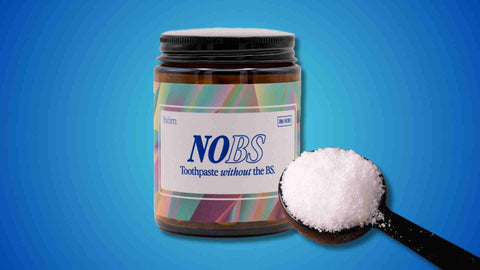What's the Deal With Zinc Citrate in Toothpaste?
Zinc citrate in your toothpaste plays a crucial role in enhancing your oral health, acting as a powerful ally against the bacteria responsible for plaque and bad breath.
Zinc salts are naturally occurring and they can inhibit the growth of harmful bacteria in your mouth that otherwise contribute to the development of dental plaque. This plaque growth, if not impeded, can lead to complications like gum disease.
By incorporating toothpaste with zinc citrate into your daily, you're not just cleaning your teeth; you're taking a proactive step towards maintaining a healthier mouth and fresher breath.
Beyond its antibacterial properties, zinc citrate also fights bad breath. It works by neutralizing volatile sulfur compounds that bacteria produce, which are often the culprits behind halitosis.
This means that brushing with a zinc citrate-containing toothpaste doesn't just mask bad breath with a minty flavor, but it addresses one of the root causes directly. As a result, you can feel more confident in your breath's freshness throughout the day, knowing you're tackling the problem at its source.
In this article, I'll explain everything you need to know about zinc citrate toothpaste with nano hydroxyapatite and why it should replace your old sodium fluoride toothpaste.
Why is zinc citrate in my toothpaste?

Zinc citrate in toothpaste is an ingredient valued for its oral health benefits, particularly its role in fighting plaque and reducing bad breath.
Zinc is a naturally occurring mineral that, when formulated as zinc citrate, becomes an effective agent against the growth of bacteria in the mouth. These bacteria are responsible for plaque formation, gum disease, and the production of volatile sulfur compounds (VSCs) that lead to bad breath.
By inhibiting the growth of these bacteria, zinc citrate helps to reduce plaque buildup, decrease the risk of gingivitis (gum inflammation), and combat halitosis (bad breath). Its antibacterial properties make it a common addition to toothpaste and mouthwashes, enhancing their ability to maintain oral hygiene.
Additionally, zinc citrate can contribute to remineralizing tooth enamel, offering further protection against decay.
Benefits of Toothpaste Containing Zinc Citrate

Zinc citrate toothpaste offers a range of benefits for oral health, making it a valuable addition to your daily dental care routine.
Let's walk through some of the key ways it can make a difference in your health.
Fights Plaque and Gum Disease
Zinc citrate is known for its antibacterial properties, which are effective in combating the plaque bacteria that cause buildup on your teeth and along the gum line.
Regular use of zinc citrate toothpaste can help prevent the formation of plaque, reducing the risk of gum disease, including gingivitis and periodontitis.
By keeping bacterial growth in check, you're taking a proactive step towards maintaining healthy gums and teeth.
Reduces Bad Breath
One of the standout benefits of zinc citrate (and other copper and zinc salts) is its ability to neutralize volatile sulfur compounds (VSCs) that are often responsible for bad breath.
Unlike some other solutions that merely mask odors, zinc citrate addresses the root cause by reducing the bacteria that produce these foul-smelling compounds.
This results in fresher breath that lasts longer, giving you confidence in your oral hygiene.
Supports Enamel Remineralization
In addition to its antibacterial effects, zinc salt can contribute to the remineralization process of tooth enamel.
This is crucial for repairing minor damage and strengthening teeth against decay.
While fluoride is typically the go-to mineral for remineralization, zinc adds an extra layer of defense, enhancing the toothpaste's ability to protect and rebuild enamel.
What are other good ingredients to look for in toothpaste?
NOBS Toothpaste Tablets are a unique type of zinc toothpaste that is jam-packed with ingredients included to nurture your oral microbiome. This unique formula makes it the best toothpaste for canker sores.
Let's walk through some of these key ingredients.
Nano Hydroxyapatite
Nano hydroxyapatite (also known as nHA) is a synthetic form of hydroxyapatite, a naturally occurring mineral found in our teeth and bones. It's known for its similarity to the mineral component of our teeth, making it a valuable ingredient in remineralizing toothpaste.
Nano hydroxyapatite is created by breaking down hydroxyapatite into nanoscale particles, which are extremely small and have unique properties. Because of this small size, its primary benefits include its ability to:
-
remineralize tooth enamel
-
repair initial stages of tooth decay
-
strengthen the tooth structure
-
and soothe tooth sensitivity.
These benefits occur because when nano hydroxyapatite is applied to the enamel surface, it can bond with the tooth's natural hydroxyapatite, repairing and strengthening the enamel.
Studies suggest that nano hydroxyapatite is equally as effective as fluoride toothpaste at remineralization and preventing dental caries. Due to some of the concerns around fluoride toxicity, many people prefer nano hydroxyapatite as a better alternative to fluoride.
Xylitol

Xylitol in toothpaste is a sugar alcohol used as a natural sweetener and for its oral health benefits. Unlike traditional sugars, xylitol does not feed the bacteria in your mouth, which means it doesn't contribute to tooth decay.
In fact, xylitol actively fights against cavity-causing bacteria, like mutans streptococci, and can prevent tooth decay by inhibiting their growth and reducing their ability to create acids that erode our enamel.
This lowers our risk of developing dental caries and promotes good dental health. That said, xylitol cannot reverse cavities.
Further, xylitol stimulates saliva production, which is beneficial for our oral health. Saliva is our natural buffer against acids that can otherwise demineralize enamel and cause tooth decay.
Because of these properties, xylitol is considered one of the best ingredients in toothpaste. Plus, its naturally sweet taste also makes toothpaste more enjoyable use to without the harmful effects of sugar, making it a popular choice for both adults and kids toothpaste.
Sodium Bicarbonate
Baking soda, also known as sodium bicarbonate, in toothpaste serves as a gentle yet effective cleaner for your teeth, offering multiple benefits for your oral health.
Its mild abrasive qualities help scrub away surface stains from your teeth, contributing to a brighter, whiter smile without damaging the enamel. This makes baking soda toothpaste an excellent choice for daily use, especially if you're looking to remove stains caused by coffee, tea, wine, or tobacco.
Further, baking soda's natural alkalinity plays a crucial role in neutralizing the plaque acids in your mouth. These acids, produced by bacteria as they digest food particles, can erode tooth enamel and lead to cavities.
By keeping the oral environment more balanced, baking soda not only protects your enamel but also supports overall gum health.
Additionally, baking soda tackles bad breath by addressing its root cause: the acidic by-products of oral bacteria. By neutralizing these acids, baking soda helps freshen your breath, leaving your mouth feeling cleaner and more refreshed.
For those with sensitive teeth, brushing teeth baking soda toothpaste can be a gentler alternative, effectively cleaning without causing discomfort.
Frequently Asked Questions
Why is zinc citrate in toothpaste?
Zinc citrate is included in toothpaste for its antibacterial properties, which help combat plaque formation and reduce the risk of gingivitis and cavities. It also aids in controlling bad breath by neutralizing sulfur compounds in the mouth. Additionally, zinc citrate supports remineralization of tooth enamel, strengthening teeth and potentially reducing sensitivity. Its inclusion in toothpaste formulations contributes to overall oral health and hygiene, making it a common ingredient in many dental care products.
Is zinc oxide safe in toothpaste?
Yes, zinc oxide is considered safe and beneficial for use in toothpaste. It serves several purposes such as providing mild abrasive properties for cleaning teeth, helping to remove plaque, and aiding in the prevention of dental caries. Additionally, zinc oxide can have a soothing effect on gums and oral tissues. When used as directed in toothpaste formulations, zinc oxide poses no significant health risks and is generally recognized as safe by regulatory authorities.
Can zinc remineralize teeth?
Zinc itself doesn't directly remineralize teeth, but it plays a supportive role in the process. Remineralization primarily involves the deposition of minerals such as calcium and phosphate back into the enamel, strengthening it. Zinc compounds like zinc citrate or zinc oxide included in toothpaste formulations can aid in this process by supporting the action of other remineralizing agents and helping to maintain a healthy oral environment. However, zinc alone is not solely responsible for remineralization; it works in conjunction with other ingredients and practices like fluoride and good oral hygiene habits.
What ingredient in toothpaste kills bacteria?
Xylitol and zinc are the key ingredients in toothpaste that effectively kill bacteria. Xylitol works by disrupting the growth and metabolism of harmful bacteria in the mouth while preserving the beneficial ones, promoting a healthier oral environment. Zinc, on the other hand, acts as an antibacterial agent by inhibiting the growth of plaque-forming bacteria and reducing the risk of gum disease and cavities. Together, these ingredients play a crucial role in maintaining oral hygiene and preventing bacterial overgrowth, ensuring a healthier mouth and fresher breath.
What ingredient in toothpaste should be avoided?
Sodium lauryl sulfate (SLS) and fluoride are two ingredients commonly found in toothpaste, but there is some debate about whether they should be avoided. SLS is a surfactant that creates foam and helps to clean teeth, but it can also cause irritation for some people, especially those with sensitive mouths. Fluoride, on the other hand, is widely recognized for its ability to prevent cavities by strengthening tooth enamel. However, some individuals may prefer to avoid fluoride due to concerns about its potential health effects when ingested in large amounts. Ultimately, whether these ingredients should be avoided depends on individual preferences and dental health needs.
What are the most harmful chemicals in toothpaste?
Several harmful chemicals commonly found in toothpaste include Sodium Lauryl Sulfate (SLS), Triclosan, artificial sweeteners, Titanium Dioxide, and parabens. SLS can cause irritation and sensitivity in some individuals, while Triclosan has raised concerns about antibiotic resistance and hormone disruption. Artificial sweeteners, such as saccharin and aspartame, may have health implications, albeit in small amounts. Titanium Dioxide may contain nanoparticles with potential skin penetration risks, and parabens have been associated with hormone disruption and possible carcinogenic effects. It's advisable to review toothpaste ingredient labels and consider alternatives to minimize exposure to these chemicals.






















